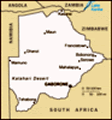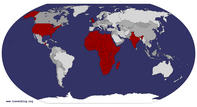Advertisement
Published: January 9th 2008
BOTSWANA
PART III
ANDRE AND THE WIRELESS LEOPARD
or
WHY MALE LIONS LOVE THEIR SISTERS
It didn’t seem fair.
I felt like we were tracking a hijacked wild animal wearing a Lojack device. But the more Andrei talked the more it made sense. After all Andrei was trying to protect these guys, not shoot them. The leopards, that is. And we just wanted to see one.
Picture it. We have driven to the top of a hill where there is a breathtaking three hundred and sixty degree view of the green savannah. It’s quiet, early evening, darker than usual because it’s raining lightly. There is the underlying sound of thousands of birds singing. You can smell the rain.
Andrei, the leopard researcher, gets out of the jeep and holds up what looks like a small television antenna. He appears a bit odd, honestly, this young, tanned, short-haired scientist sweeping the air with this somewhat anachronistic device, like some sort of Radio Shack shaman searching for signs of extraterrestrial life. The white wires from his earphone buds are dangling and plugged into a receiver on his hip. He sweeps this way and that, slowly
narrowing the field until he stops moving the arrow-like device.
“She’s out in this direction somewhere, maybe a kilometer away,” he says.
Talk about a needle in a haystack.
The leopard that Andrei has contacted is a female. Her name is Lesedi, which means Beautifl Girl. Months ago he had already trapped her in a cage, sedated her and placed a radio collar around her neck. It gives off a constant signal that he hears as a strong or weak beep, depending on her proximity.
We take off in the Land Cruiser, Dan, our ranger, at the bow and Justice, our Tracker, at the stern (it has come to feel like a nautical experience now in the Toyota, climbing up waves, sliding down into troughs, replete with wobbly legs after we tie up and climb over the rail). At one point Andrei makes a decision to see if we can find an un-collared male that he feels may be closer. That decision proves to be fruitless as we soon find ourselves buried to the axles in the soft gravel of a streambed. After much digging and jacking, another Land Cruiser comes to pull us out. We
backtrack and go after the female. With Andrei sweeping the antenna and listening to the signal, we slowly move closer and closer.
Dan leaves the dirt road and drives into what seems to be unnavigable bush. He weaves in and out of thick brush and in between stunted trees, bouncing over scattered rocks and fallen limbs. Andrei directs him from one of the back seats while holding up the antenna.
“Over there now. We’re getting closer. She should be within one hundred meters. More to your left. She’s very close. We’re right on top of her now. She’s here somewhere, right here. Very close.”
“There,” Justice says.
Lesedi is poised beautifully under a group of low trees. It is a breathtaking sight even in this fading dull light. Her markings are extraordinary. She glances at us nonchalantly before she stands and moves away, her shoulders rising and falling fluidly. We are told she weighs about 70 pounds, her male counterpart weighs twice that much. Dan moves the Land Cruiser so we can follow her. Then we see another flash of color behind the curtain of dense trees, beyond the leopard, a shade of cinnamon or russet.
The leopard is stalking a group of impala. She is now crouched, her scapulae rising up in beautiful curves under her ornate spots. She looks ahead, then back directly at us as if to say, “You know, this is not really a great time for me,” then ahead again. She is very still, and then takes one careful sliding step forward, then still again. There is a sudden cough or sneeze-like sound, then another.
“They’ve smelled her,” Dan whispers. “It’s their alarm call.”
The sound multiplies, like coughs in a cathedral, and the leopard looks at us again. You can almost see the look of absolute disgust on her face. She stands, turns, and ambles away from the impala.
Justice later confides, as we drive away, that he feels bad when this happens, as if he has somehow interfered. But judging by the numbers of impala in Mashatu, and the hundreds of babies that are literally everywhere, I should think that a healthy leopard would not go hungry. And indeed she looks well fed.
The very next day Dan and Justice, without the help of VHF technology, track and find both lion and leopard. The
lions are a young brother and sister team and are well known. We spot the male who is limping badly, following his sister at the edge of a creek. The limp is nothing new according to Dan, but worrisome nonetheless. They walk in and out of the shadows, and when they enter the bright sunshine they absolutely shimmer, their coats seem so gold. He explains that the female is the hunter, although the male is the stronger one. She hunts for him, to keep him strong, knowing that he will protect her against other predators if needs be. An adult male lion can eat up to 70 kilograms (150 pounds) of meat a day.
We drive ahead of them, and intercept the male by himself. He is walking back and forth beneath a group of tall shade trees, emitting a low growl, pacing as if disturbed by something unseen.
“He looking for his sister,” Dan tells us. “He doesn’t know where she has gone.”
Then, as if she has somehow contacted him, he struts off and disappears. Dan moves again. We drive along the edge of the creek for a few minutes, turn away, slalom through some
mopane trees, and then turn again back toward the creek.
Dan stops, turns off the engine, and then we see them. Quiet. I notice the female first, to my right. She is reclining in the dappled light, panting heavily, her shoulders heaving, her tongue lolling out between her lower canines. To my left the male is lying in the tall grasses, chewing and gnawing, his head cocked sideways to accommodate the vertical femur of the baby impala.
“She does all the work, now he gets to eat.” Dan says softly.
“She just killed that impala? Just now?” a young girl from Holland asks, not believing what she is seeing.
“Mmm,” Dan says, watching the male.
“She’ll eat later, when he’s finished?” the girl asks.
“Oh no,” Dan laughs, “He’ll finish the whole thing. She might not get anything. Sometimes if she makes a kill and he doesn’t find her right away, then she’ll get to eat. But when he shows up he’ll chase her away. It’s probably good for her that he’s got a limp.”
The sister pants. The brother eats. And this is how it is.
The following morning we see
them again in the shade of some low trees, lounging in the middle of a dry riverbed. They regard us with absolute disinterest. Their eyes close lazily and the breeze rustles their fur. Stripes of sunlight wash across their faces when they turn their huge heads through the mottled shadows.
Dan crawls up the riverbed, the gravel crunching under the tires, splashing through the meandering stream. Then he stops again, depresses the clutch, and turns the key.
“There’s a big boy,” he says casually, looking off to his right.
I search the bank of the river, the crest of the hill that rises to our right, the sky. I look at Dan and watch his eyes, then follow them and am shocked to see it. A huge male leopard, He is lying on a rock shelf in the hillside right next to us, twenty yards away. Perhaps he’s the one that Andre was looking for. If so, he’s double the weight of our female, 140 pounds. He yawns, stands, stretches, then pads off his shelf and down to the water in the riverbed. We can easily see the size of his paws, although the word “paw” seems
hardly adequate to describe his beautiful feet. He walks so gracefully, moving like smoke as he descends the rock steps. He jumps noiselessly over a pool, then dips low on his front legs to drink, his elegant coat and beautiful face reflecting in the water. He continues across the riverbed and climbs the bank on the opposite side, sliding away through the green grasses.
Leopards are solitary creatures. And this big boy may have been returning to feast solo on an impala he had hung in a tree earlier. He clearly had had enough of this Land Criuiser, this odd species that stops to gawk but does not hunt.
We then drive to the very top of a tall hill, the tallest around. Dan stops and cuts the engine. There is only the rustle of wind and the backdrop of birdsong. Elephants graze nearby. In the distance the slender necks of giraffes rise above the treetops. The sun is setting to the west, and the full moon is about to rise in the east. Justice folds down the tail of the Land Cruiser, for this species does have a tail, and a very useful one at that. Then he asks the loveliest of questions:
“Gin and tonic?”
PASTE THIS IN THERE AND SEE WHAT YOU GET:
http://www.mashatu.com/research_predator.htm
Advertisement
Tot: 0.114s; Tpl: 0.021s; cc: 8; qc: 29; dbt: 0.038s; 1; m:domysql w:travelblog (10.17.0.13); sld: 1;
; mem: 1.1mb











Thys
non-member comment
Great Story
The authors of this article are spot on. We were also at Mashatu, and they could be describing our own experience there!The expectancy while tracking the leopards, the rough off-road ride following the radio collar pulsating signal, and then the exhiliration of finding the leopards. The skills of the leopard researcher, the driver of the vehicle and the trackers finding the animals make it a wonderful experience. And at the end, the relaxation of the gin and tonic, watching the sun set over the Africa bush. Unforgettable!!